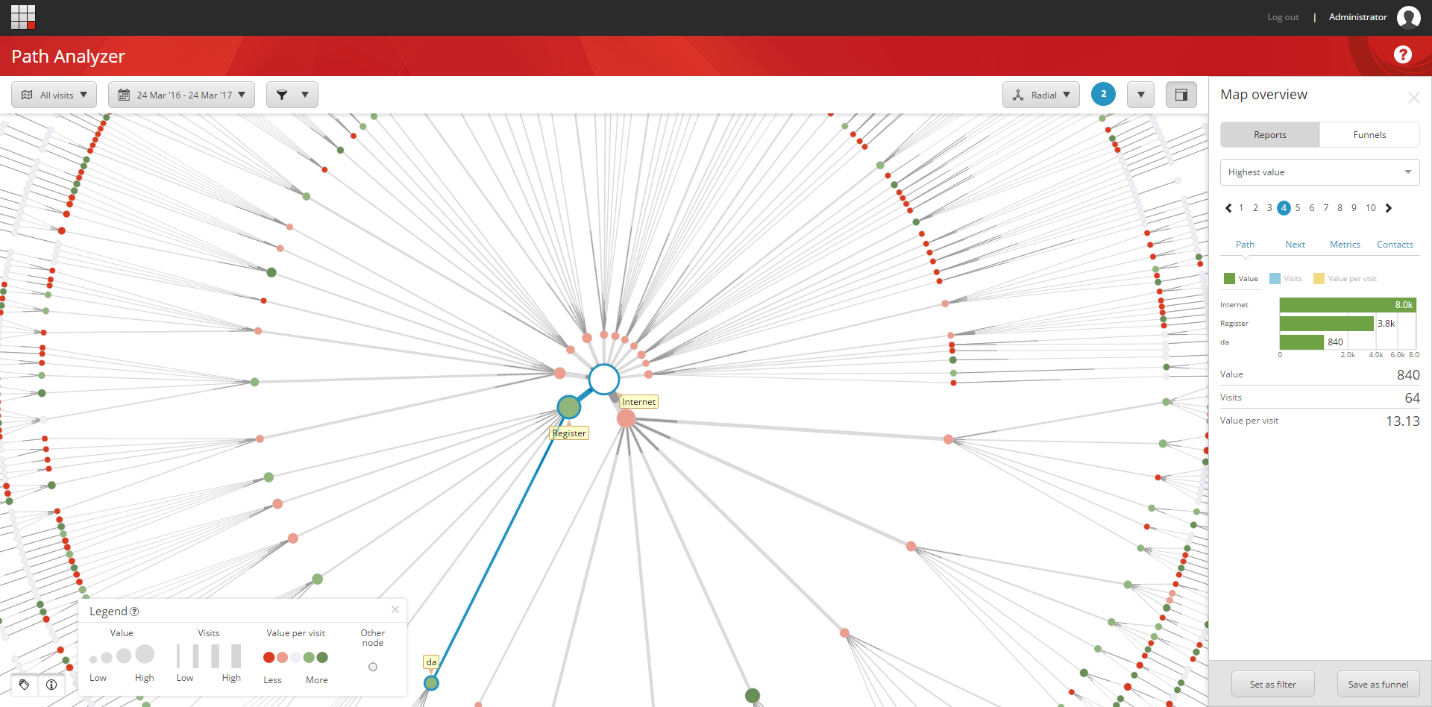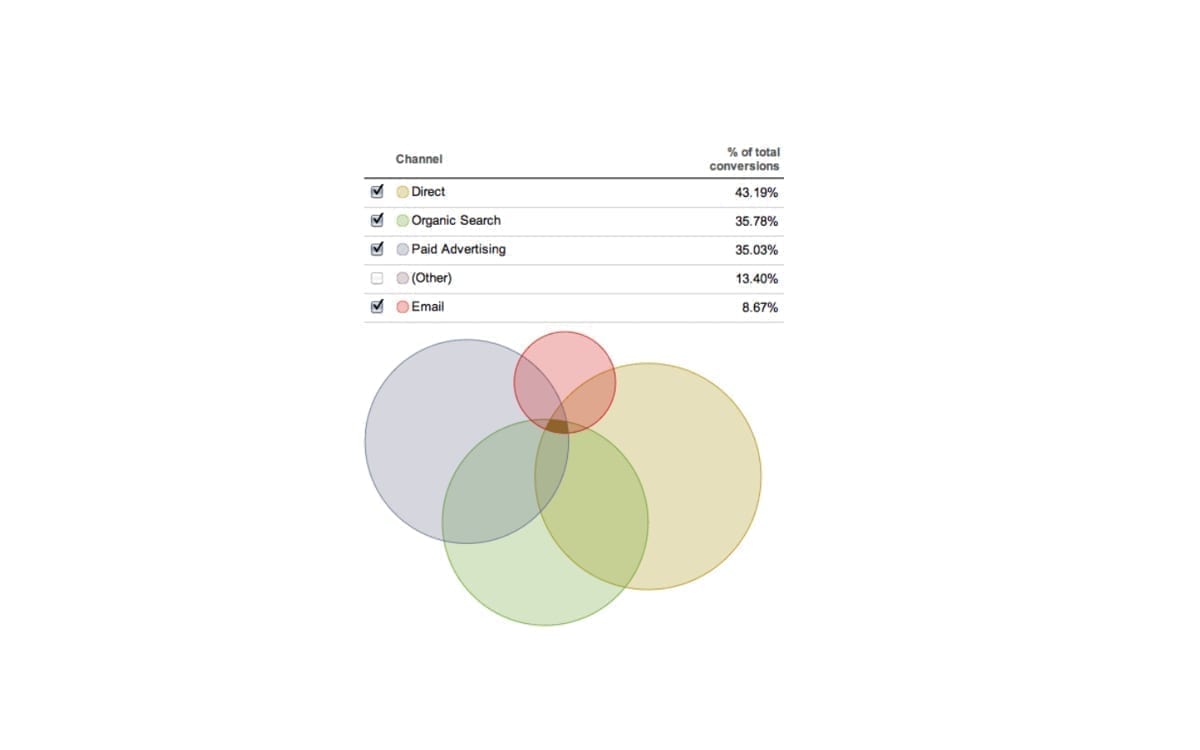Sophisticated marketers who use web analytics platforms are three times more likely to outperform their peers in achieving revenue goals. Data-driven customer insights are vital for identifying who organisations want to target and what they need to target them with in order to drive them further down the sales funnel.
Sitecore Analytics and Google Analytics (GA) are valuable web analysis tools. They provide in-depth reporting to measure website performance and marketing effectiveness which can then be optimised to be more successful and drive results.
Google Analytics launched way back in 2005 and it’s evident that this platform has more dimensions, metrics, reports and features available directly off the shelf. Marketers are familiar with the platform, and even if not, the intuitive interface is easy to navigate and comprehend. On the other hand, the Sitecore infrastructure has been designed for high-performance data collection at granular levels of detail. There’s a powerful combination of Sitecore’s content profiling capabilities supplementing the segmentation that can be managed by Google Analytics or other web analytics tools.
Google Analytics vs Sitecore experience database (XDB)
Whilst Sitecore Analytics and Google Analytics are similar tools, there are few platforms that are able to extend a single and personalised view of the customer across digital channels.
Enter Sitecore Experience Database (xDB).
Sitecore’s Experience Analytics database is called the xDB – in essence, scale and detail are at the heart of it. It’s built on a data marketing repository using MongoDB and delivers a robust dataset for each customer. It highlights an individual’s online experience, their interactions, who they are, and what they need.

Four compelling reasons for marketers to use Sitecore reporting:
1. Customer experience
Every interaction with your customer, both online and offline, can be stored in the experience database. It enables marketers to collect insights from a wide range of sessions and users. With the Experience Profile, you can even drill down the behaviour of a single user and use these insights to communicate on a personal and relevant way.
2. Drive value with contextual content
Sitecore’s Experience Profile gives marketers an unparalleled, real-time view into how customers are interacting with their brand in that very moment. The ability to personalise content and automate lead nurturing based on campaign origin, triggered goals, engagement value thresholds and visitor profile is directly tied to effective data tracking via Sitecore xDB.
3. User behaviour
The experience profile can track an individual’s interactions online, however, the real magic happens when this insight is coupled with the personalisation and automation tools. If, for example, an email is sent to registered users who haven’t returned in X amount of days, the subsequent content can be super personalised and relevant.
4. Beyond vanity metrics
Focusing on the wrong marketing metrics is a huge productivity blocker. Metrics help guide where marketers assign resource, and if the wrong KPIs are being tracked, the key objectives are being forgotten. Managers should ask themselves how their team are spending their time. Are they spending their time trying to get more Page Views, Likes or Downloads? Or are they working toward improving the company’s bottom line with metrics of value? Loyalty, Lifetime Value, Active Users, these are the KPIs that matter.
Sitecore xDB supports enterprise marketers to gain the respect of the boardroom (not to mention earn a bigger slice of the company budget). Excellent marketing teams should be highly focused on revenue, ROI and company growth while leaving so-called vanity metrics behind. Page Views and Sessions really don’t cut it when reporting on the value of your marketing efforts.
It’s not over for Google Analytics
There are obvious advantages to siding with the world-dominating, overlords of Google for your reporting analytics: you receive intuitive, off-the-shelf reporting tools, an active community of engaged peers – and it’s free (if on a basic account profile). It’s important to understand the benefits that go-beyond initial setup.
Three compelling reasons for marketers to use Google Analytics reporting:
1. Deep integration with Google products
Marketers can easily integrate data from other Google products such as AdWords, AdSense and Webmaster Tools. AdWords, the advertising platform of Google, is actually the only reason why GA is free and at the top of its field. Marketers spending media budget on AdWords should certainly use GA to evaluate the Return on Investment of campaigns. The well-known UTM-tagging functionality to track specific campaign traffic and the cost data import features in GA are also very useful to evaluate other paid attribution channels next to AdWords.
2. Multi-channel funnels
The Multi-Channel Funnels reports give marketers insight into how marketing channels work together to create sales and conversions. Many prospects, for example, may visit your site via Organic Search, however, if they have been introduced to a brand via an email or when targeted via an advert on social media, the Multi-Channel Funnels reports show how previous channels contribute to your conversions.

3. Google Analytics 360 suite
Hailed as “an enterprise-class solution for a multi-screen world” Google Analytics 360 Suite (GA360) is increasingly the solution of choice for enterprise marketers. GA360 offers a powerful and integrated analytics solution that is used by many of the world’s biggest enterprises. The standard Google Analytics tool is a great, free platform, and will continue to be the market-leading solution for many organisations for the foreseeable future. However, Google Analytics 360 has a lot to offer larger organisations with high volume sites, complex analysis and attribution requirements, or simply require the flexibility of an integrated solution for tracking, analysing, optimising and reporting on their digital marketing strategy.
What are the drawbacks with Google Analytics?
There are a number of setbacks with GA compared to Sitecore Analytics. GA isn’t a server-side operation and there is a delay in receiving data, meaning it may not be completely accurate. GA is also renowned for being targeted by spammers, which can skew data. If your account is not being managed by an expert, you may also be receiving traffic from sources that are not relevant e.g. internal traffic and employee IPs. Visitors can also disable tracking in Google meaning valuable data is hidden. Google Analytics can be extended using its API, but this requires significant development expertise. It is for this reason that marketers and analysts struggle to achieve the level of integration with GA that is readily available with the likes of Sitecore Analytics.
Google Analytics inline with Google’s Privacy Policy meaning it can’t report on personal data such as contact form details. The EU General Data Protection Regulation (GDPR) coming into force from 25 May 2018 means that enterprises will have to deliver a compliance roadmap to protect their data. Sitecore’s response to GDPR is xDB. Using xDB to store personal information allows you to have a better understanding of where the data is, the rules and when to use it. For marketers using Sitecore, it is essential that any personal identifying factors are stripped out of the system before the law comes into force next year.
Data-driven insights for enterprise marketers
Any enterprise marketer with Sitecore xDB at their fingertips is in an enviable position. However, to be best in your market, you should use both GA and Sitecore analytics in conjunction. They are different products that suit different circumstances. Both are market leaders at what they offer.
Google Analytics is easy to setup and use. It’s a useful tool for reporting on your headline metrics – Acquisition, Sessions, Bounce Rate etc. Sitecore allows you to look deeply into individual customers and measure their engagement with your brand, across whatever device they’re using. You can see a level of detail that is simply not available within Google Analytics, plus you can use the data collected to automate and personalise contextual content instantly.
Our philosophy is simple. Each technology brings different positives, and they should be used in unison. Organisations will gain the most rewards by leveraging Google Analytics’ maturity in filtering and segmentation while focusing on Sitecore for detailed, enriched data and real-time optimisation which drives automated and personalised, contextual content to support marketing campaigns.
Sitecore gold implementation partner
DEPT® has been a Sitecore partner since 2013 and achieved Gold Implementation status within the first year. If you need a new implementation and migration from your existing CMS or are looking to upgrade to Sitecore 8 to explore the xDB product, we can guide you. Our Sitecore-Certified developers in the UK, US, Amsterdam, Macedonia and Spain have experience supporting enterprises such as Pentair and Imperial Brands to maximise multilingual capabilities, automated marketing, testing and personalisation.
DEPT® can develop a Sitecore solution which will sit at the heart of your enterprise, and enable you to deliver customer experience improvements to improve your conversion, retention and, ultimately, the ROI of your digital investment.






